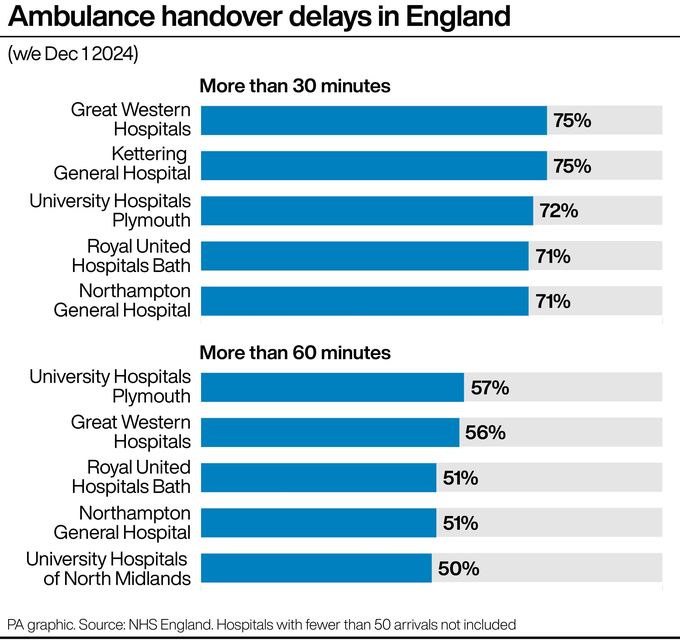More than a third of patients arriving by ambulance at hospitals in England last week waited more than 30 minutes to be handed over to A&E, figures show.
There were 32,635 delays of half an hour or longer recorded across all hospital trusts in the week to December 1.
This was 36% of the 90,514 arrivals by ambulance where the handover time was known.
The figure is higher than in the equivalent week last year, when 27% of patients arriving by ambulance waited more than 30 minutes, and also in 2022, when it was 31%.
The data has been published by the NHS as part of its first weekly snapshot of hospital performance in England this winter.
It also shows that 16% of ambulance handovers – or 14,805 patients- last week were delayed by more than an hour, compared with 10% at the equivalent point in 2023 and 15% in 2022.
(PA Graphics)
Analysis by the PA news agency shows that, among those trusts reporting at least 50 ambulance arrivals in the week to December 1 2024, the highest proportion of patients waiting more than 30 minutes to be handed over was 75.2% at Great Western Hospitals (316 out of 420 patients where the handover time is known).
This was followed by Kettering General Hospital at 74.9% (439 of 586 patients), University Hospitals Plymouth at 72.0% (427 of 593 patients) and Royal United Hospitals Bath at 71.0% (357 of 503 patients).
The highest proportion of patients waiting more than an hour to be handed to A&E teams was recorded at University Hospitals Plymouth, at 57.2% (339 of 593 patients), followed by Great Western Hospitals at 56.0% (235 of 420 patients), Royal United Hospitals Bath at 51.3% (258 of 503 patients) and Northampton General Hospital at 51.2% (289 of 565 patients).
Handover delays of new patients can reflect a shortage of beds on wards, which in turn is affected by delays in discharging people who are medically fit to leave hospital.
An average of 11,969 hospital beds per day last week in England were occupied by people ready to be discharged, taking up one in eight of all occupied adult general and acute beds.
Rory Deighton, acute director at the NHS Confederation, the membership organisation for the healthcare system, described the figures are “deeply worrying” and evidence the NHS is “already under considerable strain before the pressures of winter have peaked.”
He added: “Ambulance handover delays are already much higher than the same week last year, while bed occupancy remains above safe levels.
“NHS leaders and their teams are working incredibly hard to provide patients the care they need in very difficult circumstances and signs suggest we are going to be facing a very tough winter.
“Tackling the capacity problems in social care is going to be critical if we are going to ensure that future winters are not as difficult.
“But we also hope the 10-year plan for health and the spending review next year will give the NHS the financial security it needs to start making the big shifts in care needed to achieve the government’s ambitions.
“Providing more preventative care out of hospital will be a key way of reducing pressures on ambulances and A&Es.”
